BM563 Report: Operation & Service Management and Quality at Tesco
VerifiedAdded on 2023/06/17
|11
|3251
|67
Report
AI Summary
This report provides an analysis of Tesco's operation and service management practices, focusing on the quality management standards and systems implemented by the company. It explores how Tesco utilizes principles such as customer focus, leadership, and process approaches to maintain quality. The report evaluates the impact of these standards on Tesco's efficiency, discussing benefits like operational consistency, continuous improvements, and increased profits, while also acknowledging the high costs associated with quality management. Furthermore, it examines how technology is embedded in Tesco's quality management, reducing human error, increasing production yield, and ensuring compliance with standards. The report also considers how quality management supports organizational goals through standard operating procedures, ultimately contributing to the overall performance of the organization. This document is available on Desklib, a platform offering a wide range of study resources for students.
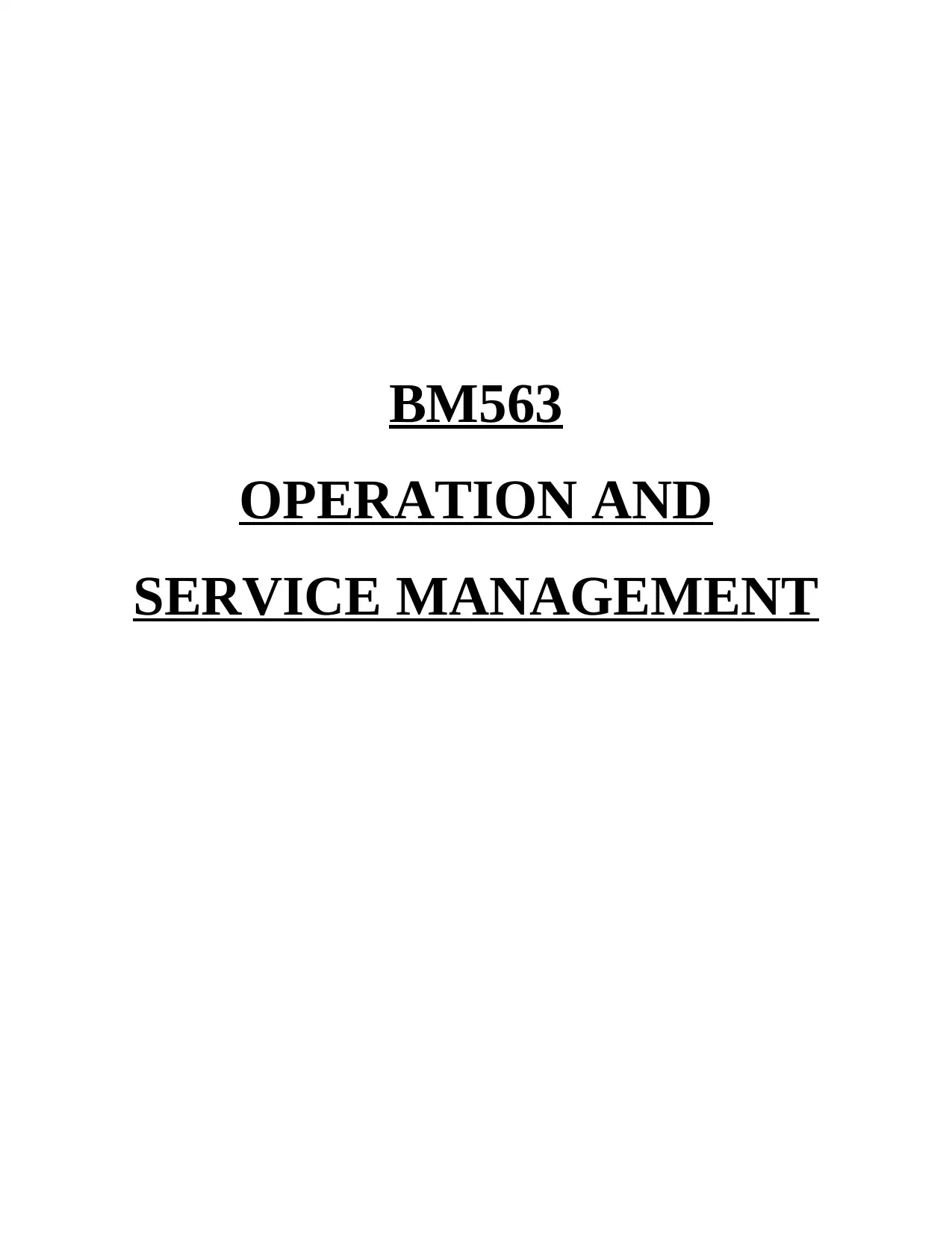
BM563
OPERATION AND
SERVICE MANAGEMENT
OPERATION AND
SERVICE MANAGEMENT
Paraphrase This Document
Need a fresh take? Get an instant paraphrase of this document with our AI Paraphraser
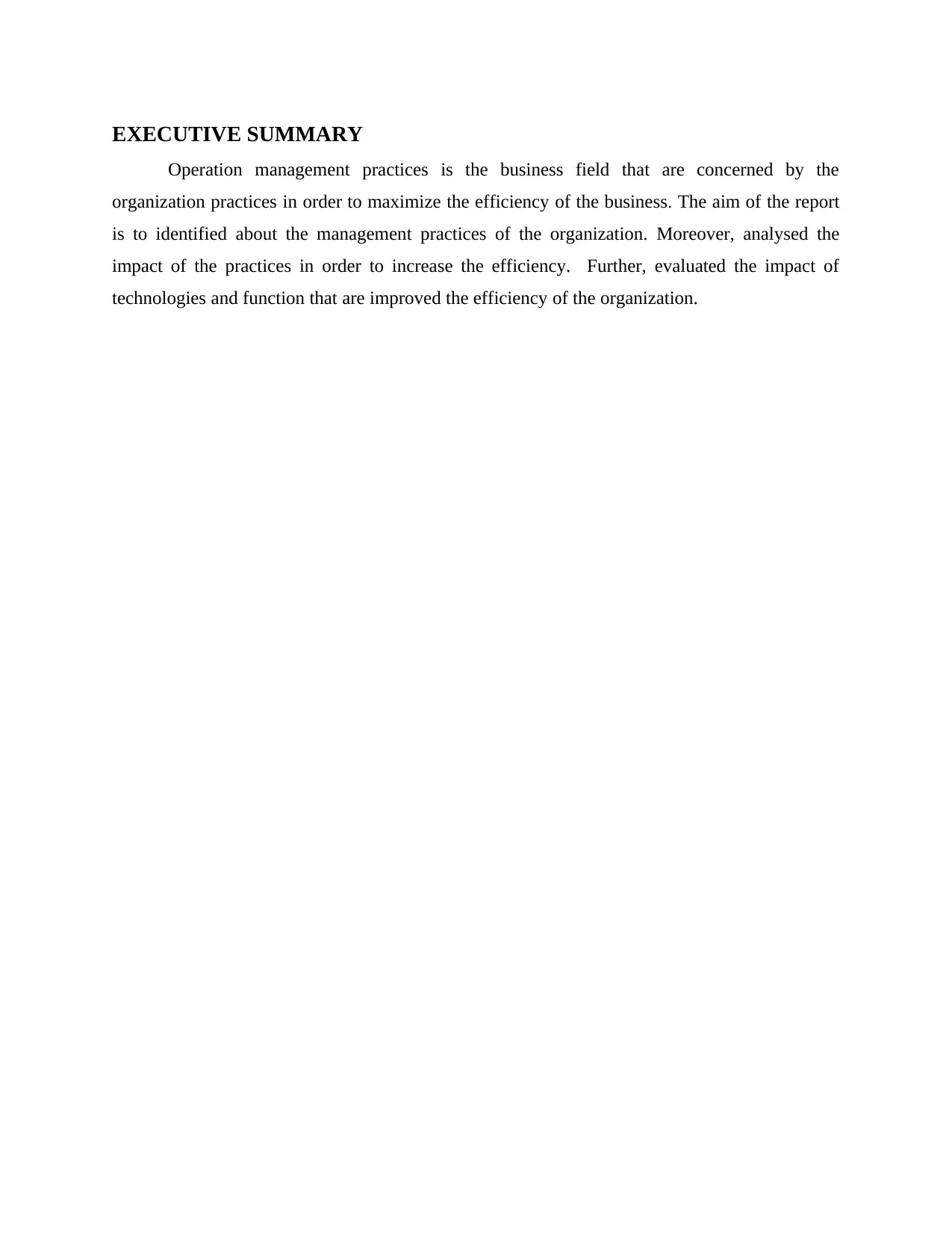
EXECUTIVE SUMMARY
Operation management practices is the business field that are concerned by the
organization practices in order to maximize the efficiency of the business. The aim of the report
is to identified about the management practices of the organization. Moreover, analysed the
impact of the practices in order to increase the efficiency. Further, evaluated the impact of
technologies and function that are improved the efficiency of the organization.
Operation management practices is the business field that are concerned by the
organization practices in order to maximize the efficiency of the business. The aim of the report
is to identified about the management practices of the organization. Moreover, analysed the
impact of the practices in order to increase the efficiency. Further, evaluated the impact of
technologies and function that are improved the efficiency of the organization.
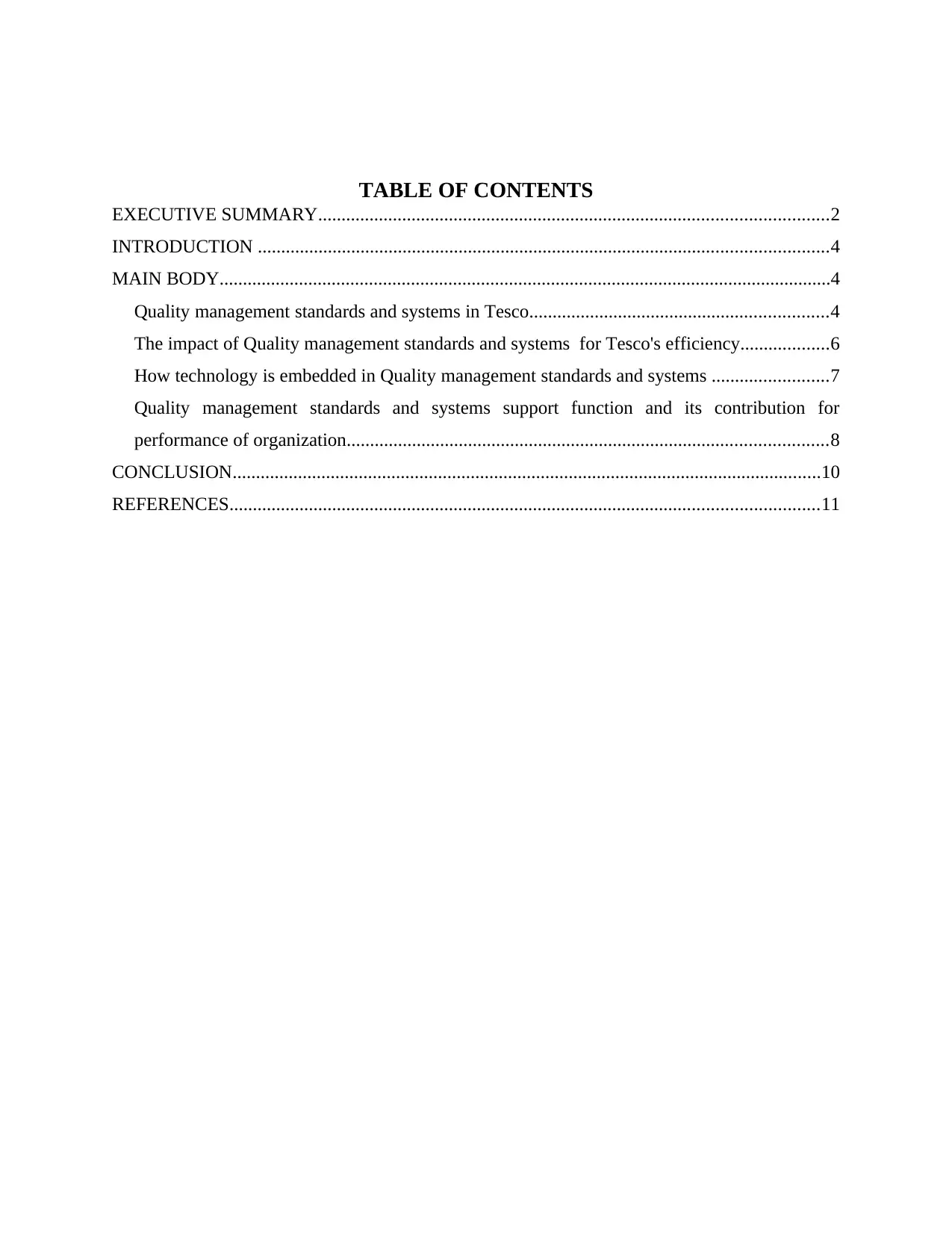
TABLE OF CONTENTS
EXECUTIVE SUMMARY.............................................................................................................2
INTRODUCTION ..........................................................................................................................4
MAIN BODY...................................................................................................................................4
Quality management standards and systems in Tesco................................................................4
The impact of Quality management standards and systems for Tesco's efficiency...................6
How technology is embedded in Quality management standards and systems .........................7
Quality management standards and systems support function and its contribution for
performance of organization.......................................................................................................8
CONCLUSION..............................................................................................................................10
REFERENCES..............................................................................................................................11
EXECUTIVE SUMMARY.............................................................................................................2
INTRODUCTION ..........................................................................................................................4
MAIN BODY...................................................................................................................................4
Quality management standards and systems in Tesco................................................................4
The impact of Quality management standards and systems for Tesco's efficiency...................6
How technology is embedded in Quality management standards and systems .........................7
Quality management standards and systems support function and its contribution for
performance of organization.......................................................................................................8
CONCLUSION..............................................................................................................................10
REFERENCES..............................................................................................................................11
You're viewing a preview
Unlock full access by subscribing today!
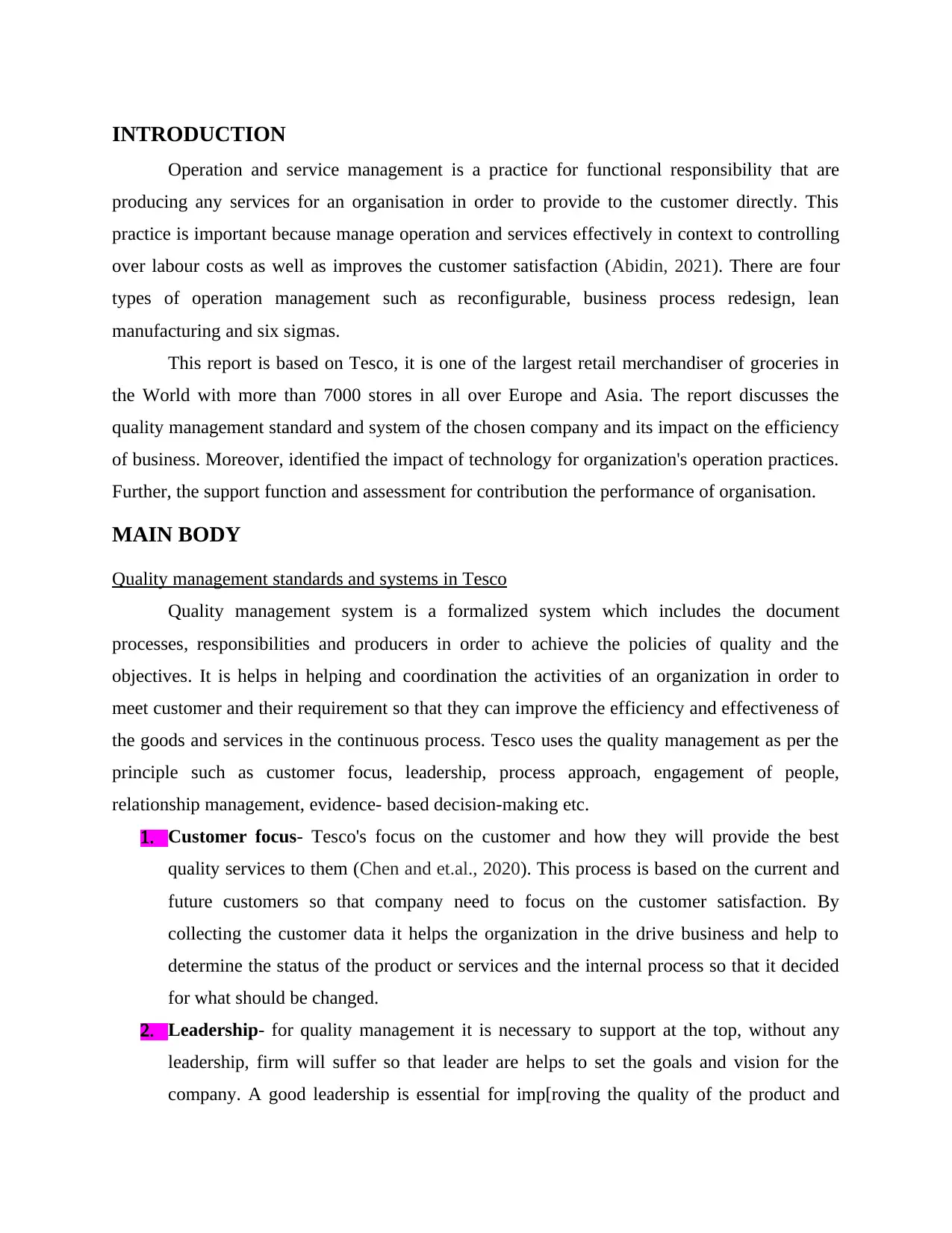
INTRODUCTION
Operation and service management is a practice for functional responsibility that are
producing any services for an organisation in order to provide to the customer directly. This
practice is important because manage operation and services effectively in context to controlling
over labour costs as well as improves the customer satisfaction (Abidin, 2021). There are four
types of operation management such as reconfigurable, business process redesign, lean
manufacturing and six sigmas.
This report is based on Tesco, it is one of the largest retail merchandiser of groceries in
the World with more than 7000 stores in all over Europe and Asia. The report discusses the
quality management standard and system of the chosen company and its impact on the efficiency
of business. Moreover, identified the impact of technology for organization's operation practices.
Further, the support function and assessment for contribution the performance of organisation.
MAIN BODY
Quality management standards and systems in Tesco
Quality management system is a formalized system which includes the document
processes, responsibilities and producers in order to achieve the policies of quality and the
objectives. It is helps in helping and coordination the activities of an organization in order to
meet customer and their requirement so that they can improve the efficiency and effectiveness of
the goods and services in the continuous process. Tesco uses the quality management as per the
principle such as customer focus, leadership, process approach, engagement of people,
relationship management, evidence- based decision-making etc.
1. Customer focus- Tesco's focus on the customer and how they will provide the best
quality services to them (Chen and et.al., 2020). This process is based on the current and
future customers so that company need to focus on the customer satisfaction. By
collecting the customer data it helps the organization in the drive business and help to
determine the status of the product or services and the internal process so that it decided
for what should be changed.
2. Leadership- for quality management it is necessary to support at the top, without any
leadership, firm will suffer so that leader are helps to set the goals and vision for the
company. A good leadership is essential for imp[roving the quality of the product and
Operation and service management is a practice for functional responsibility that are
producing any services for an organisation in order to provide to the customer directly. This
practice is important because manage operation and services effectively in context to controlling
over labour costs as well as improves the customer satisfaction (Abidin, 2021). There are four
types of operation management such as reconfigurable, business process redesign, lean
manufacturing and six sigmas.
This report is based on Tesco, it is one of the largest retail merchandiser of groceries in
the World with more than 7000 stores in all over Europe and Asia. The report discusses the
quality management standard and system of the chosen company and its impact on the efficiency
of business. Moreover, identified the impact of technology for organization's operation practices.
Further, the support function and assessment for contribution the performance of organisation.
MAIN BODY
Quality management standards and systems in Tesco
Quality management system is a formalized system which includes the document
processes, responsibilities and producers in order to achieve the policies of quality and the
objectives. It is helps in helping and coordination the activities of an organization in order to
meet customer and their requirement so that they can improve the efficiency and effectiveness of
the goods and services in the continuous process. Tesco uses the quality management as per the
principle such as customer focus, leadership, process approach, engagement of people,
relationship management, evidence- based decision-making etc.
1. Customer focus- Tesco's focus on the customer and how they will provide the best
quality services to them (Chen and et.al., 2020). This process is based on the current and
future customers so that company need to focus on the customer satisfaction. By
collecting the customer data it helps the organization in the drive business and help to
determine the status of the product or services and the internal process so that it decided
for what should be changed.
2. Leadership- for quality management it is necessary to support at the top, without any
leadership, firm will suffer so that leader are helps to set the goals and vision for the
company. A good leadership is essential for imp[roving the quality of the product and
Paraphrase This Document
Need a fresh take? Get an instant paraphrase of this document with our AI Paraphraser
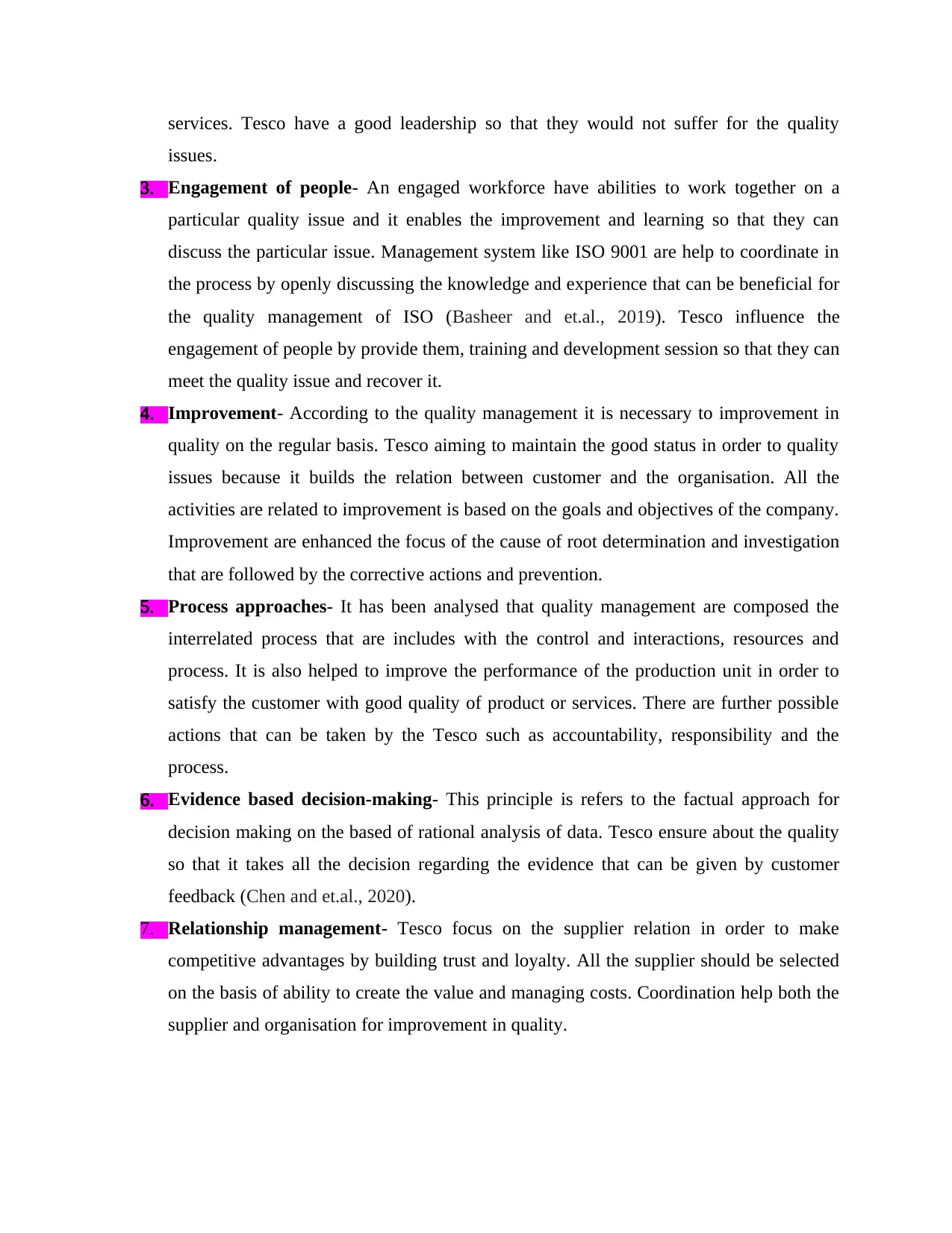
services. Tesco have a good leadership so that they would not suffer for the quality
issues.
3. Engagement of people- An engaged workforce have abilities to work together on a
particular quality issue and it enables the improvement and learning so that they can
discuss the particular issue. Management system like ISO 9001 are help to coordinate in
the process by openly discussing the knowledge and experience that can be beneficial for
the quality management of ISO (Basheer and et.al., 2019). Tesco influence the
engagement of people by provide them, training and development session so that they can
meet the quality issue and recover it.
4. Improvement- According to the quality management it is necessary to improvement in
quality on the regular basis. Tesco aiming to maintain the good status in order to quality
issues because it builds the relation between customer and the organisation. All the
activities are related to improvement is based on the goals and objectives of the company.
Improvement are enhanced the focus of the cause of root determination and investigation
that are followed by the corrective actions and prevention.
5. Process approaches- It has been analysed that quality management are composed the
interrelated process that are includes with the control and interactions, resources and
process. It is also helped to improve the performance of the production unit in order to
satisfy the customer with good quality of product or services. There are further possible
actions that can be taken by the Tesco such as accountability, responsibility and the
process.
6. Evidence based decision-making- This principle is refers to the factual approach for
decision making on the based of rational analysis of data. Tesco ensure about the quality
so that it takes all the decision regarding the evidence that can be given by customer
feedback (Chen and et.al., 2020).
7. Relationship management- Tesco focus on the supplier relation in order to make
competitive advantages by building trust and loyalty. All the supplier should be selected
on the basis of ability to create the value and managing costs. Coordination help both the
supplier and organisation for improvement in quality.
issues.
3. Engagement of people- An engaged workforce have abilities to work together on a
particular quality issue and it enables the improvement and learning so that they can
discuss the particular issue. Management system like ISO 9001 are help to coordinate in
the process by openly discussing the knowledge and experience that can be beneficial for
the quality management of ISO (Basheer and et.al., 2019). Tesco influence the
engagement of people by provide them, training and development session so that they can
meet the quality issue and recover it.
4. Improvement- According to the quality management it is necessary to improvement in
quality on the regular basis. Tesco aiming to maintain the good status in order to quality
issues because it builds the relation between customer and the organisation. All the
activities are related to improvement is based on the goals and objectives of the company.
Improvement are enhanced the focus of the cause of root determination and investigation
that are followed by the corrective actions and prevention.
5. Process approaches- It has been analysed that quality management are composed the
interrelated process that are includes with the control and interactions, resources and
process. It is also helped to improve the performance of the production unit in order to
satisfy the customer with good quality of product or services. There are further possible
actions that can be taken by the Tesco such as accountability, responsibility and the
process.
6. Evidence based decision-making- This principle is refers to the factual approach for
decision making on the based of rational analysis of data. Tesco ensure about the quality
so that it takes all the decision regarding the evidence that can be given by customer
feedback (Chen and et.al., 2020).
7. Relationship management- Tesco focus on the supplier relation in order to make
competitive advantages by building trust and loyalty. All the supplier should be selected
on the basis of ability to create the value and managing costs. Coordination help both the
supplier and organisation for improvement in quality.
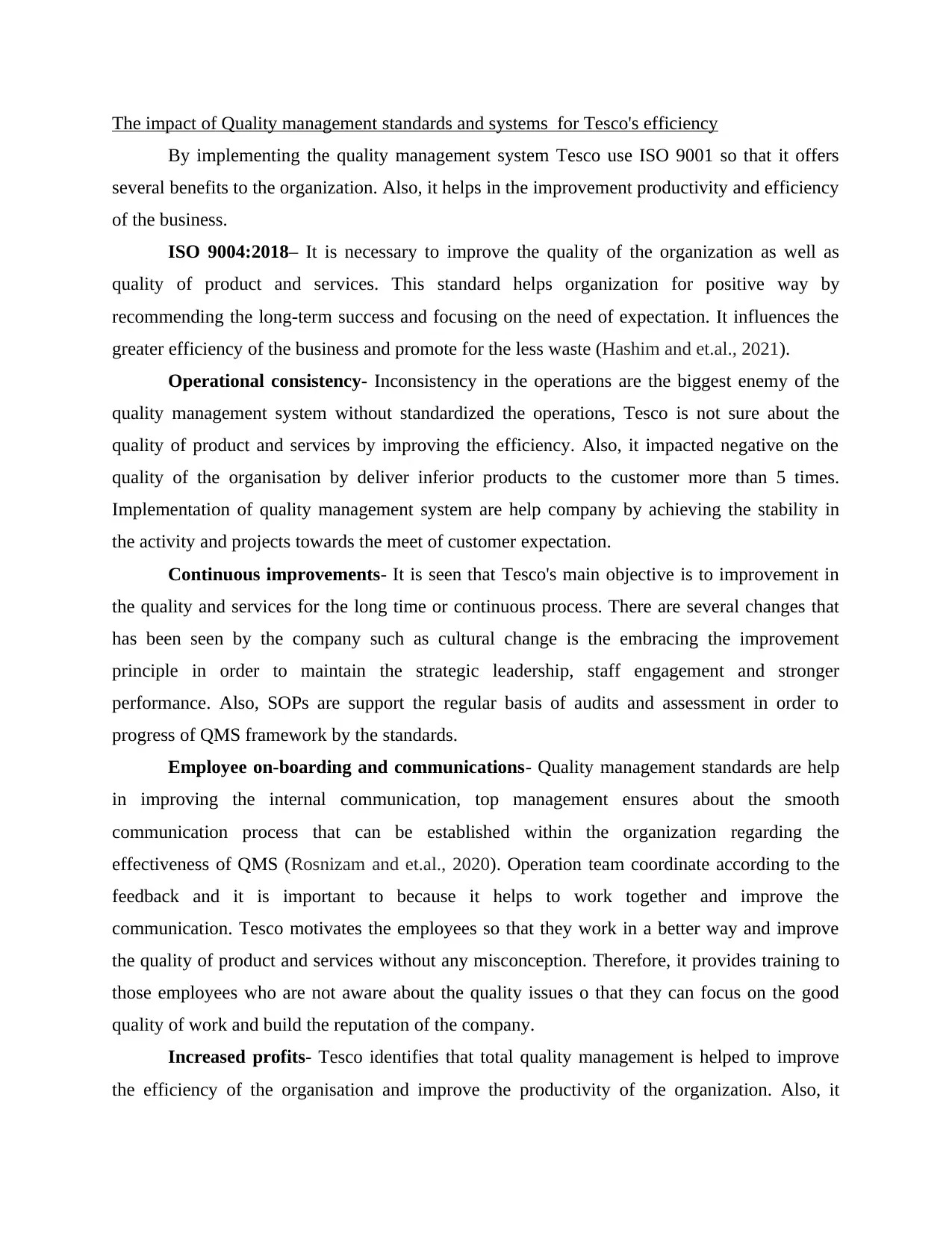
The impact of Quality management standards and systems for Tesco's efficiency
By implementing the quality management system Tesco use ISO 9001 so that it offers
several benefits to the organization. Also, it helps in the improvement productivity and efficiency
of the business.
ISO 9004:2018– It is necessary to improve the quality of the organization as well as
quality of product and services. This standard helps organization for positive way by
recommending the long-term success and focusing on the need of expectation. It influences the
greater efficiency of the business and promote for the less waste (Hashim and et.al., 2021).
Operational consistency- Inconsistency in the operations are the biggest enemy of the
quality management system without standardized the operations, Tesco is not sure about the
quality of product and services by improving the efficiency. Also, it impacted negative on the
quality of the organisation by deliver inferior products to the customer more than 5 times.
Implementation of quality management system are help company by achieving the stability in
the activity and projects towards the meet of customer expectation.
Continuous improvements- It is seen that Tesco's main objective is to improvement in
the quality and services for the long time or continuous process. There are several changes that
has been seen by the company such as cultural change is the embracing the improvement
principle in order to maintain the strategic leadership, staff engagement and stronger
performance. Also, SOPs are support the regular basis of audits and assessment in order to
progress of QMS framework by the standards.
Employee on-boarding and communications- Quality management standards are help
in improving the internal communication, top management ensures about the smooth
communication process that can be established within the organization regarding the
effectiveness of QMS (Rosnizam and et.al., 2020). Operation team coordinate according to the
feedback and it is important to because it helps to work together and improve the
communication. Tesco motivates the employees so that they work in a better way and improve
the quality of product and services without any misconception. Therefore, it provides training to
those employees who are not aware about the quality issues o that they can focus on the good
quality of work and build the reputation of the company.
Increased profits- Tesco identifies that total quality management is helped to improve
the efficiency of the organisation and improve the productivity of the organization. Also, it
By implementing the quality management system Tesco use ISO 9001 so that it offers
several benefits to the organization. Also, it helps in the improvement productivity and efficiency
of the business.
ISO 9004:2018– It is necessary to improve the quality of the organization as well as
quality of product and services. This standard helps organization for positive way by
recommending the long-term success and focusing on the need of expectation. It influences the
greater efficiency of the business and promote for the less waste (Hashim and et.al., 2021).
Operational consistency- Inconsistency in the operations are the biggest enemy of the
quality management system without standardized the operations, Tesco is not sure about the
quality of product and services by improving the efficiency. Also, it impacted negative on the
quality of the organisation by deliver inferior products to the customer more than 5 times.
Implementation of quality management system are help company by achieving the stability in
the activity and projects towards the meet of customer expectation.
Continuous improvements- It is seen that Tesco's main objective is to improvement in
the quality and services for the long time or continuous process. There are several changes that
has been seen by the company such as cultural change is the embracing the improvement
principle in order to maintain the strategic leadership, staff engagement and stronger
performance. Also, SOPs are support the regular basis of audits and assessment in order to
progress of QMS framework by the standards.
Employee on-boarding and communications- Quality management standards are help
in improving the internal communication, top management ensures about the smooth
communication process that can be established within the organization regarding the
effectiveness of QMS (Rosnizam and et.al., 2020). Operation team coordinate according to the
feedback and it is important to because it helps to work together and improve the
communication. Tesco motivates the employees so that they work in a better way and improve
the quality of product and services without any misconception. Therefore, it provides training to
those employees who are not aware about the quality issues o that they can focus on the good
quality of work and build the reputation of the company.
Increased profits- Tesco identifies that total quality management is helped to improve
the efficiency of the organisation and improve the productivity of the organization. Also, it
You're viewing a preview
Unlock full access by subscribing today!
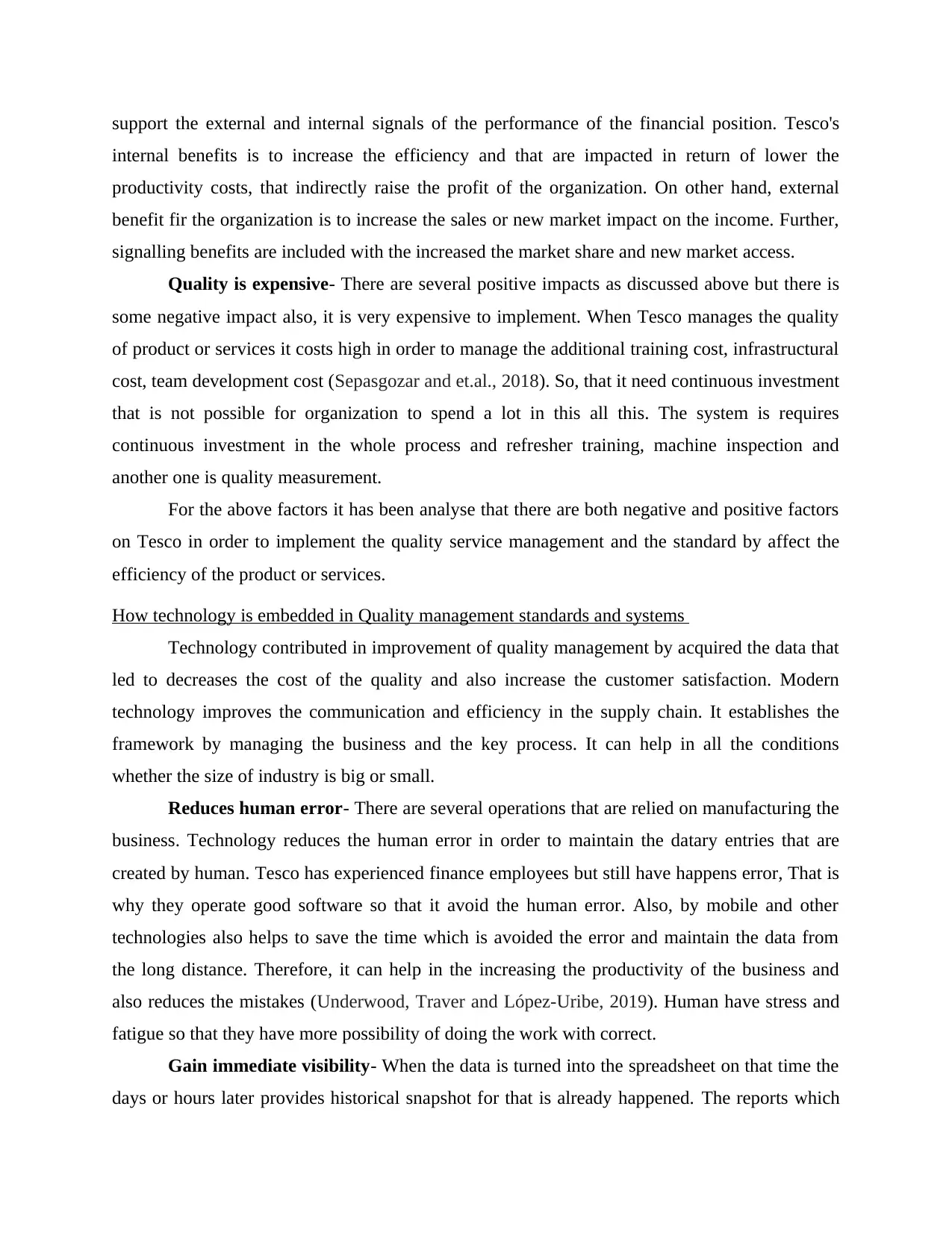
support the external and internal signals of the performance of the financial position. Tesco's
internal benefits is to increase the efficiency and that are impacted in return of lower the
productivity costs, that indirectly raise the profit of the organization. On other hand, external
benefit fir the organization is to increase the sales or new market impact on the income. Further,
signalling benefits are included with the increased the market share and new market access.
Quality is expensive- There are several positive impacts as discussed above but there is
some negative impact also, it is very expensive to implement. When Tesco manages the quality
of product or services it costs high in order to manage the additional training cost, infrastructural
cost, team development cost (Sepasgozar and et.al., 2018). So, that it need continuous investment
that is not possible for organization to spend a lot in this all this. The system is requires
continuous investment in the whole process and refresher training, machine inspection and
another one is quality measurement.
For the above factors it has been analyse that there are both negative and positive factors
on Tesco in order to implement the quality service management and the standard by affect the
efficiency of the product or services.
How technology is embedded in Quality management standards and systems
Technology contributed in improvement of quality management by acquired the data that
led to decreases the cost of the quality and also increase the customer satisfaction. Modern
technology improves the communication and efficiency in the supply chain. It establishes the
framework by managing the business and the key process. It can help in all the conditions
whether the size of industry is big or small.
Reduces human error- There are several operations that are relied on manufacturing the
business. Technology reduces the human error in order to maintain the datary entries that are
created by human. Tesco has experienced finance employees but still have happens error, That is
why they operate good software so that it avoid the human error. Also, by mobile and other
technologies also helps to save the time which is avoided the error and maintain the data from
the long distance. Therefore, it can help in the increasing the productivity of the business and
also reduces the mistakes (Underwood, Traver and López-Uribe, 2019). Human have stress and
fatigue so that they have more possibility of doing the work with correct.
Gain immediate visibility- When the data is turned into the spreadsheet on that time the
days or hours later provides historical snapshot for that is already happened. The reports which
internal benefits is to increase the efficiency and that are impacted in return of lower the
productivity costs, that indirectly raise the profit of the organization. On other hand, external
benefit fir the organization is to increase the sales or new market impact on the income. Further,
signalling benefits are included with the increased the market share and new market access.
Quality is expensive- There are several positive impacts as discussed above but there is
some negative impact also, it is very expensive to implement. When Tesco manages the quality
of product or services it costs high in order to manage the additional training cost, infrastructural
cost, team development cost (Sepasgozar and et.al., 2018). So, that it need continuous investment
that is not possible for organization to spend a lot in this all this. The system is requires
continuous investment in the whole process and refresher training, machine inspection and
another one is quality measurement.
For the above factors it has been analyse that there are both negative and positive factors
on Tesco in order to implement the quality service management and the standard by affect the
efficiency of the product or services.
How technology is embedded in Quality management standards and systems
Technology contributed in improvement of quality management by acquired the data that
led to decreases the cost of the quality and also increase the customer satisfaction. Modern
technology improves the communication and efficiency in the supply chain. It establishes the
framework by managing the business and the key process. It can help in all the conditions
whether the size of industry is big or small.
Reduces human error- There are several operations that are relied on manufacturing the
business. Technology reduces the human error in order to maintain the datary entries that are
created by human. Tesco has experienced finance employees but still have happens error, That is
why they operate good software so that it avoid the human error. Also, by mobile and other
technologies also helps to save the time which is avoided the error and maintain the data from
the long distance. Therefore, it can help in the increasing the productivity of the business and
also reduces the mistakes (Underwood, Traver and López-Uribe, 2019). Human have stress and
fatigue so that they have more possibility of doing the work with correct.
Gain immediate visibility- When the data is turned into the spreadsheet on that time the
days or hours later provides historical snapshot for that is already happened. The reports which
Paraphrase This Document
Need a fresh take? Get an instant paraphrase of this document with our AI Paraphraser
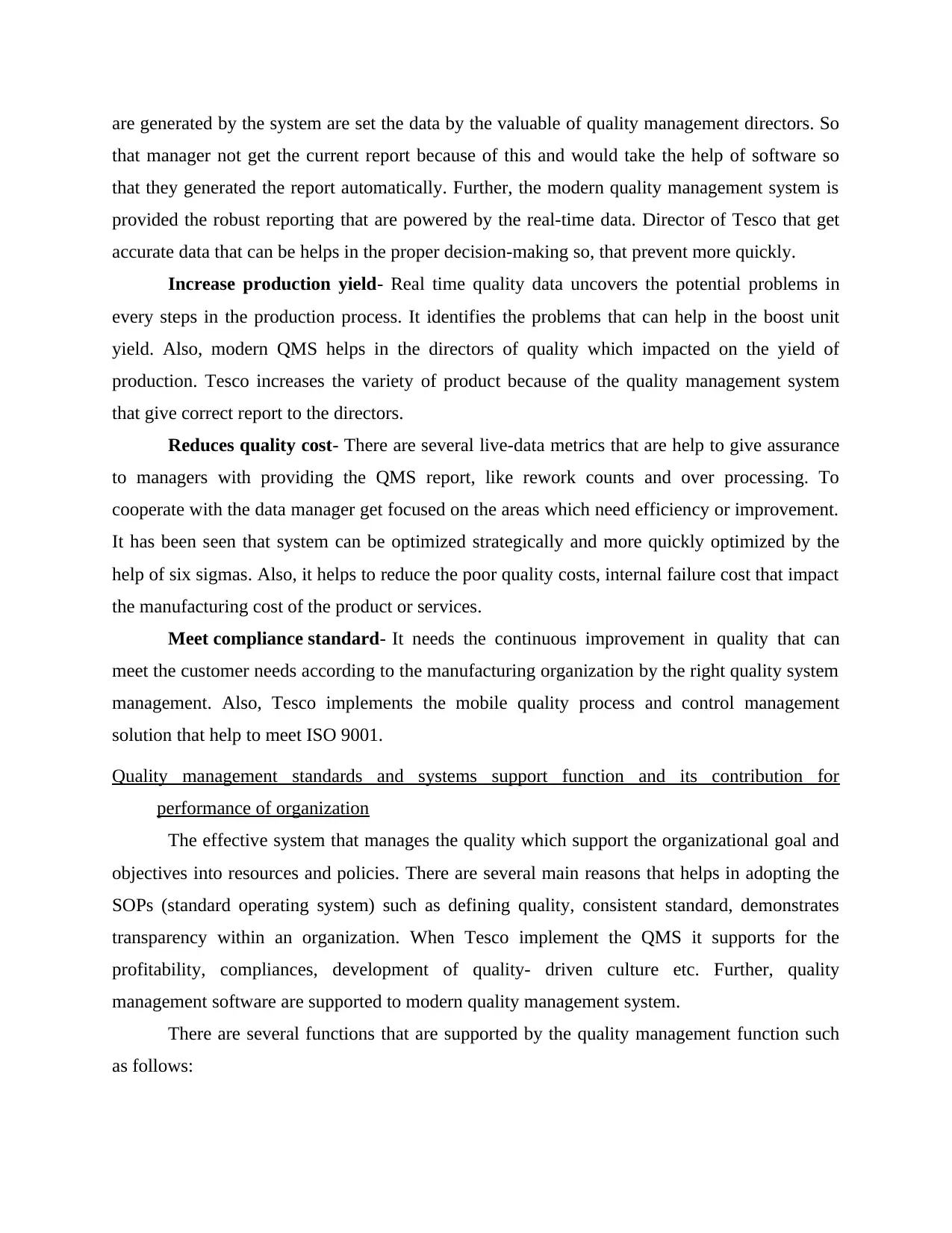
are generated by the system are set the data by the valuable of quality management directors. So
that manager not get the current report because of this and would take the help of software so
that they generated the report automatically. Further, the modern quality management system is
provided the robust reporting that are powered by the real-time data. Director of Tesco that get
accurate data that can be helps in the proper decision-making so, that prevent more quickly.
Increase production yield- Real time quality data uncovers the potential problems in
every steps in the production process. It identifies the problems that can help in the boost unit
yield. Also, modern QMS helps in the directors of quality which impacted on the yield of
production. Tesco increases the variety of product because of the quality management system
that give correct report to the directors.
Reduces quality cost- There are several live-data metrics that are help to give assurance
to managers with providing the QMS report, like rework counts and over processing. To
cooperate with the data manager get focused on the areas which need efficiency or improvement.
It has been seen that system can be optimized strategically and more quickly optimized by the
help of six sigmas. Also, it helps to reduce the poor quality costs, internal failure cost that impact
the manufacturing cost of the product or services.
Meet compliance standard- It needs the continuous improvement in quality that can
meet the customer needs according to the manufacturing organization by the right quality system
management. Also, Tesco implements the mobile quality process and control management
solution that help to meet ISO 9001.
Quality management standards and systems support function and its contribution for
performance of organization
The effective system that manages the quality which support the organizational goal and
objectives into resources and policies. There are several main reasons that helps in adopting the
SOPs (standard operating system) such as defining quality, consistent standard, demonstrates
transparency within an organization. When Tesco implement the QMS it supports for the
profitability, compliances, development of quality- driven culture etc. Further, quality
management software are supported to modern quality management system.
There are several functions that are supported by the quality management function such
as follows:
that manager not get the current report because of this and would take the help of software so
that they generated the report automatically. Further, the modern quality management system is
provided the robust reporting that are powered by the real-time data. Director of Tesco that get
accurate data that can be helps in the proper decision-making so, that prevent more quickly.
Increase production yield- Real time quality data uncovers the potential problems in
every steps in the production process. It identifies the problems that can help in the boost unit
yield. Also, modern QMS helps in the directors of quality which impacted on the yield of
production. Tesco increases the variety of product because of the quality management system
that give correct report to the directors.
Reduces quality cost- There are several live-data metrics that are help to give assurance
to managers with providing the QMS report, like rework counts and over processing. To
cooperate with the data manager get focused on the areas which need efficiency or improvement.
It has been seen that system can be optimized strategically and more quickly optimized by the
help of six sigmas. Also, it helps to reduce the poor quality costs, internal failure cost that impact
the manufacturing cost of the product or services.
Meet compliance standard- It needs the continuous improvement in quality that can
meet the customer needs according to the manufacturing organization by the right quality system
management. Also, Tesco implements the mobile quality process and control management
solution that help to meet ISO 9001.
Quality management standards and systems support function and its contribution for
performance of organization
The effective system that manages the quality which support the organizational goal and
objectives into resources and policies. There are several main reasons that helps in adopting the
SOPs (standard operating system) such as defining quality, consistent standard, demonstrates
transparency within an organization. When Tesco implement the QMS it supports for the
profitability, compliances, development of quality- driven culture etc. Further, quality
management software are supported to modern quality management system.
There are several functions that are supported by the quality management function such
as follows:
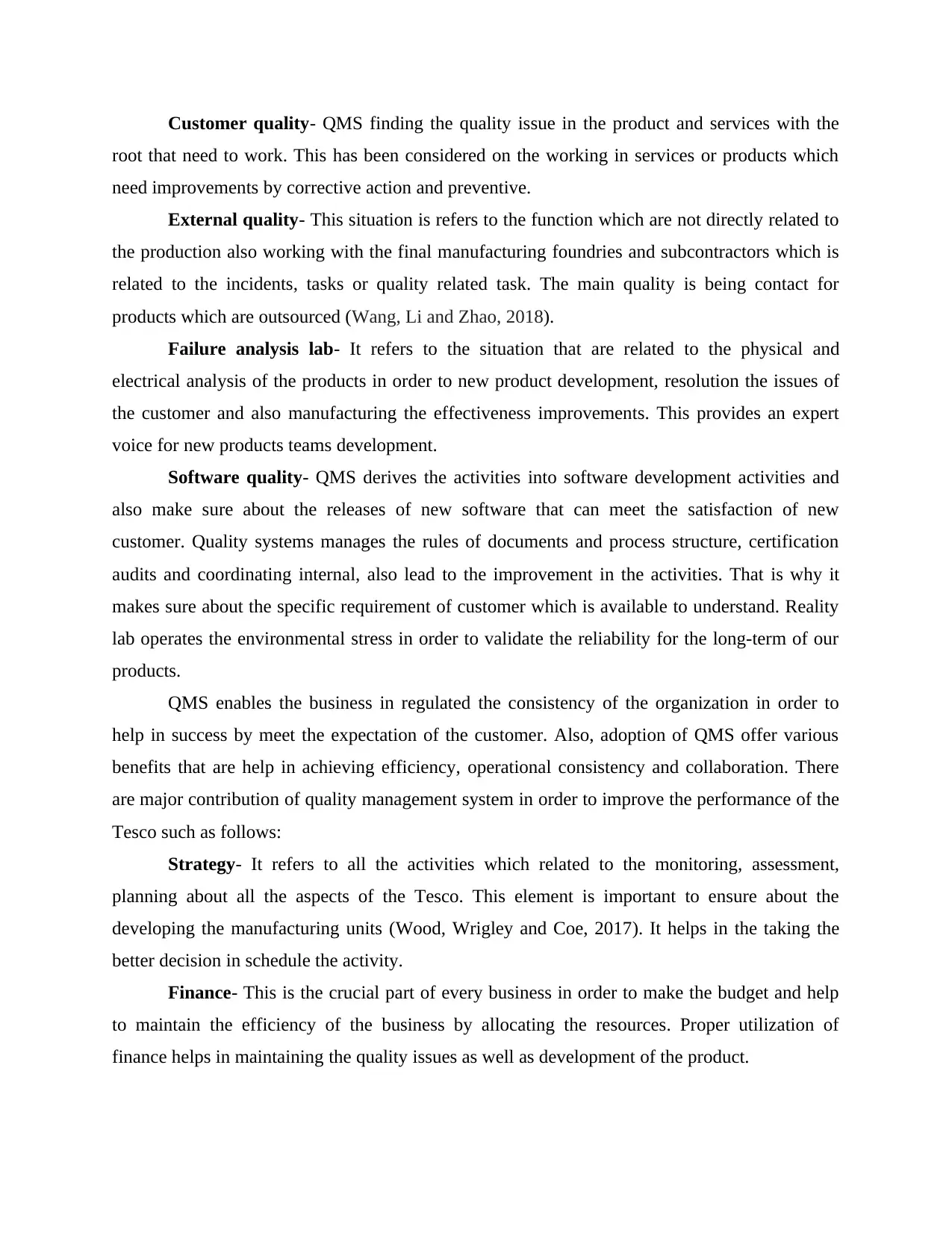
Customer quality- QMS finding the quality issue in the product and services with the
root that need to work. This has been considered on the working in services or products which
need improvements by corrective action and preventive.
External quality- This situation is refers to the function which are not directly related to
the production also working with the final manufacturing foundries and subcontractors which is
related to the incidents, tasks or quality related task. The main quality is being contact for
products which are outsourced (Wang, Li and Zhao, 2018).
Failure analysis lab- It refers to the situation that are related to the physical and
electrical analysis of the products in order to new product development, resolution the issues of
the customer and also manufacturing the effectiveness improvements. This provides an expert
voice for new products teams development.
Software quality- QMS derives the activities into software development activities and
also make sure about the releases of new software that can meet the satisfaction of new
customer. Quality systems manages the rules of documents and process structure, certification
audits and coordinating internal, also lead to the improvement in the activities. That is why it
makes sure about the specific requirement of customer which is available to understand. Reality
lab operates the environmental stress in order to validate the reliability for the long-term of our
products.
QMS enables the business in regulated the consistency of the organization in order to
help in success by meet the expectation of the customer. Also, adoption of QMS offer various
benefits that are help in achieving efficiency, operational consistency and collaboration. There
are major contribution of quality management system in order to improve the performance of the
Tesco such as follows:
Strategy- It refers to all the activities which related to the monitoring, assessment,
planning about all the aspects of the Tesco. This element is important to ensure about the
developing the manufacturing units (Wood, Wrigley and Coe, 2017). It helps in the taking the
better decision in schedule the activity.
Finance- This is the crucial part of every business in order to make the budget and help
to maintain the efficiency of the business by allocating the resources. Proper utilization of
finance helps in maintaining the quality issues as well as development of the product.
root that need to work. This has been considered on the working in services or products which
need improvements by corrective action and preventive.
External quality- This situation is refers to the function which are not directly related to
the production also working with the final manufacturing foundries and subcontractors which is
related to the incidents, tasks or quality related task. The main quality is being contact for
products which are outsourced (Wang, Li and Zhao, 2018).
Failure analysis lab- It refers to the situation that are related to the physical and
electrical analysis of the products in order to new product development, resolution the issues of
the customer and also manufacturing the effectiveness improvements. This provides an expert
voice for new products teams development.
Software quality- QMS derives the activities into software development activities and
also make sure about the releases of new software that can meet the satisfaction of new
customer. Quality systems manages the rules of documents and process structure, certification
audits and coordinating internal, also lead to the improvement in the activities. That is why it
makes sure about the specific requirement of customer which is available to understand. Reality
lab operates the environmental stress in order to validate the reliability for the long-term of our
products.
QMS enables the business in regulated the consistency of the organization in order to
help in success by meet the expectation of the customer. Also, adoption of QMS offer various
benefits that are help in achieving efficiency, operational consistency and collaboration. There
are major contribution of quality management system in order to improve the performance of the
Tesco such as follows:
Strategy- It refers to all the activities which related to the monitoring, assessment,
planning about all the aspects of the Tesco. This element is important to ensure about the
developing the manufacturing units (Wood, Wrigley and Coe, 2017). It helps in the taking the
better decision in schedule the activity.
Finance- This is the crucial part of every business in order to make the budget and help
to maintain the efficiency of the business by allocating the resources. Proper utilization of
finance helps in maintaining the quality issues as well as development of the product.
You're viewing a preview
Unlock full access by subscribing today!
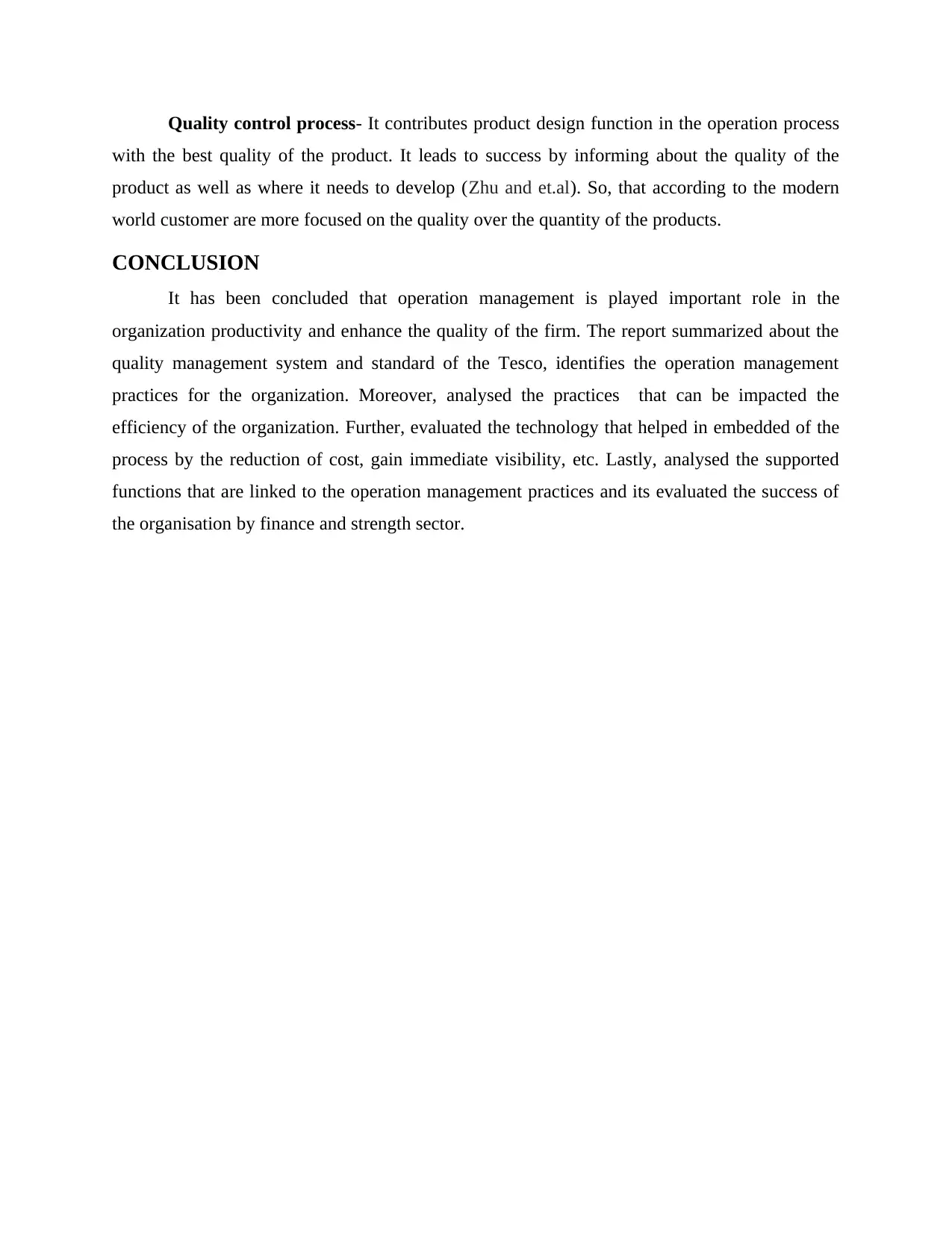
Quality control process- It contributes product design function in the operation process
with the best quality of the product. It leads to success by informing about the quality of the
product as well as where it needs to develop (Zhu and et.al). So, that according to the modern
world customer are more focused on the quality over the quantity of the products.
CONCLUSION
It has been concluded that operation management is played important role in the
organization productivity and enhance the quality of the firm. The report summarized about the
quality management system and standard of the Tesco, identifies the operation management
practices for the organization. Moreover, analysed the practices that can be impacted the
efficiency of the organization. Further, evaluated the technology that helped in embedded of the
process by the reduction of cost, gain immediate visibility, etc. Lastly, analysed the supported
functions that are linked to the operation management practices and its evaluated the success of
the organisation by finance and strength sector.
with the best quality of the product. It leads to success by informing about the quality of the
product as well as where it needs to develop (Zhu and et.al). So, that according to the modern
world customer are more focused on the quality over the quantity of the products.
CONCLUSION
It has been concluded that operation management is played important role in the
organization productivity and enhance the quality of the firm. The report summarized about the
quality management system and standard of the Tesco, identifies the operation management
practices for the organization. Moreover, analysed the practices that can be impacted the
efficiency of the organization. Further, evaluated the technology that helped in embedded of the
process by the reduction of cost, gain immediate visibility, etc. Lastly, analysed the supported
functions that are linked to the operation management practices and its evaluated the success of
the organisation by finance and strength sector.
Paraphrase This Document
Need a fresh take? Get an instant paraphrase of this document with our AI Paraphraser
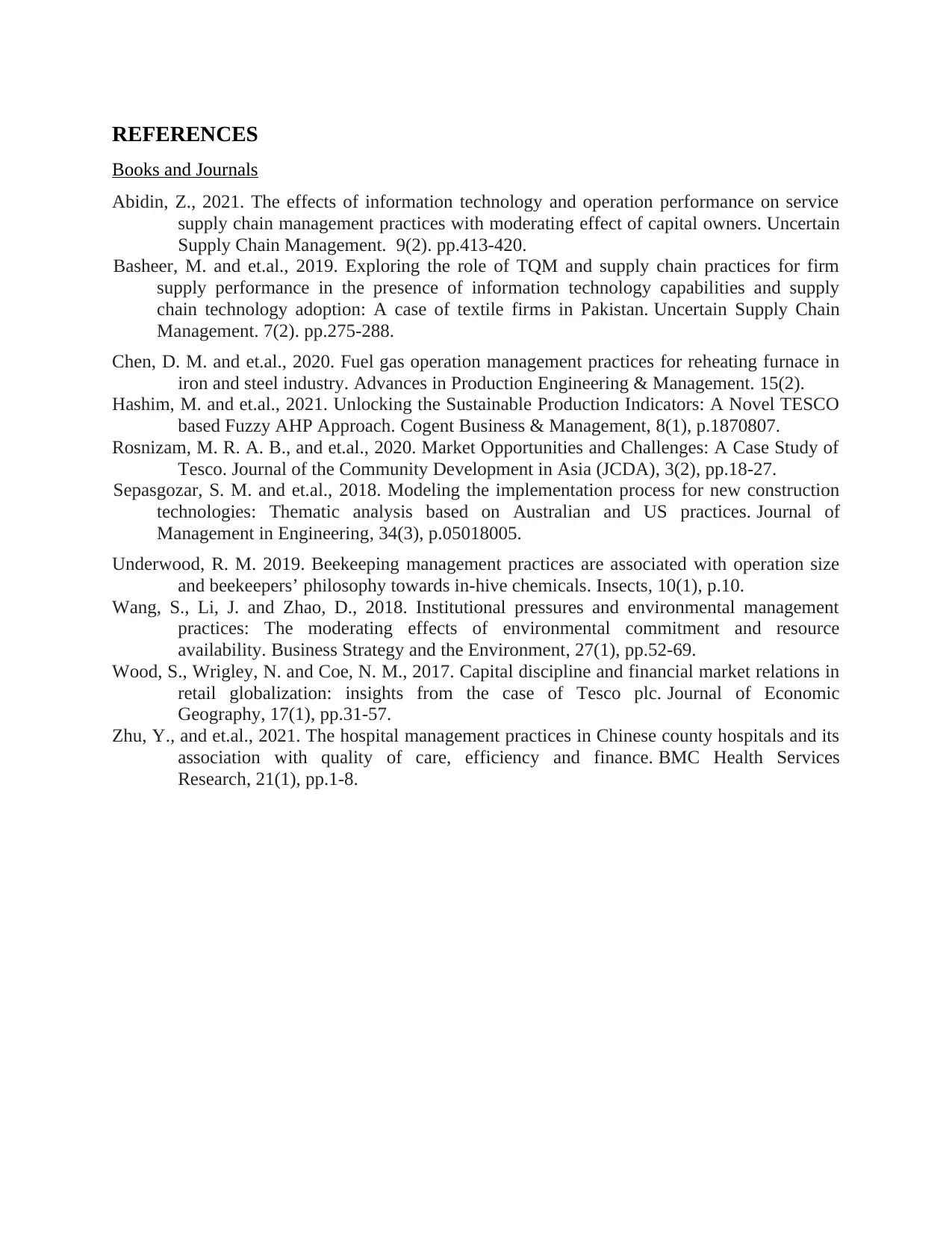
REFERENCES
Books and Journals
Abidin, Z., 2021. The effects of information technology and operation performance on service
supply chain management practices with moderating effect of capital owners. Uncertain
Supply Chain Management. 9(2). pp.413-420.
Basheer, M. and et.al., 2019. Exploring the role of TQM and supply chain practices for firm
supply performance in the presence of information technology capabilities and supply
chain technology adoption: A case of textile firms in Pakistan. Uncertain Supply Chain
Management. 7(2). pp.275-288.
Chen, D. M. and et.al., 2020. Fuel gas operation management practices for reheating furnace in
iron and steel industry. Advances in Production Engineering & Management. 15(2).
Hashim, M. and et.al., 2021. Unlocking the Sustainable Production Indicators: A Novel TESCO
based Fuzzy AHP Approach. Cogent Business & Management, 8(1), p.1870807.
Rosnizam, M. R. A. B., and et.al., 2020. Market Opportunities and Challenges: A Case Study of
Tesco. Journal of the Community Development in Asia (JCDA), 3(2), pp.18-27.
Sepasgozar, S. M. and et.al., 2018. Modeling the implementation process for new construction
technologies: Thematic analysis based on Australian and US practices. Journal of
Management in Engineering, 34(3), p.05018005.
Underwood, R. M. 2019. Beekeeping management practices are associated with operation size
and beekeepers’ philosophy towards in-hive chemicals. Insects, 10(1), p.10.
Wang, S., Li, J. and Zhao, D., 2018. Institutional pressures and environmental management
practices: The moderating effects of environmental commitment and resource
availability. Business Strategy and the Environment, 27(1), pp.52-69.
Wood, S., Wrigley, N. and Coe, N. M., 2017. Capital discipline and financial market relations in
retail globalization: insights from the case of Tesco plc. Journal of Economic
Geography, 17(1), pp.31-57.
Zhu, Y., and et.al., 2021. The hospital management practices in Chinese county hospitals and its
association with quality of care, efficiency and finance. BMC Health Services
Research, 21(1), pp.1-8.
Books and Journals
Abidin, Z., 2021. The effects of information technology and operation performance on service
supply chain management practices with moderating effect of capital owners. Uncertain
Supply Chain Management. 9(2). pp.413-420.
Basheer, M. and et.al., 2019. Exploring the role of TQM and supply chain practices for firm
supply performance in the presence of information technology capabilities and supply
chain technology adoption: A case of textile firms in Pakistan. Uncertain Supply Chain
Management. 7(2). pp.275-288.
Chen, D. M. and et.al., 2020. Fuel gas operation management practices for reheating furnace in
iron and steel industry. Advances in Production Engineering & Management. 15(2).
Hashim, M. and et.al., 2021. Unlocking the Sustainable Production Indicators: A Novel TESCO
based Fuzzy AHP Approach. Cogent Business & Management, 8(1), p.1870807.
Rosnizam, M. R. A. B., and et.al., 2020. Market Opportunities and Challenges: A Case Study of
Tesco. Journal of the Community Development in Asia (JCDA), 3(2), pp.18-27.
Sepasgozar, S. M. and et.al., 2018. Modeling the implementation process for new construction
technologies: Thematic analysis based on Australian and US practices. Journal of
Management in Engineering, 34(3), p.05018005.
Underwood, R. M. 2019. Beekeeping management practices are associated with operation size
and beekeepers’ philosophy towards in-hive chemicals. Insects, 10(1), p.10.
Wang, S., Li, J. and Zhao, D., 2018. Institutional pressures and environmental management
practices: The moderating effects of environmental commitment and resource
availability. Business Strategy and the Environment, 27(1), pp.52-69.
Wood, S., Wrigley, N. and Coe, N. M., 2017. Capital discipline and financial market relations in
retail globalization: insights from the case of Tesco plc. Journal of Economic
Geography, 17(1), pp.31-57.
Zhu, Y., and et.al., 2021. The hospital management practices in Chinese county hospitals and its
association with quality of care, efficiency and finance. BMC Health Services
Research, 21(1), pp.1-8.
1 out of 11
Related Documents
Your All-in-One AI-Powered Toolkit for Academic Success.
+13062052269
info@desklib.com
Available 24*7 on WhatsApp / Email
![[object Object]](/_next/static/media/star-bottom.7253800d.svg)
Unlock your academic potential
© 2024 | Zucol Services PVT LTD | All rights reserved.



